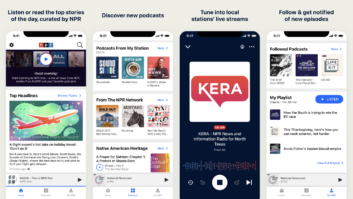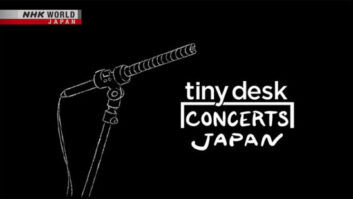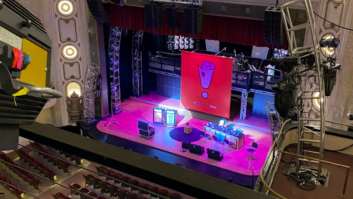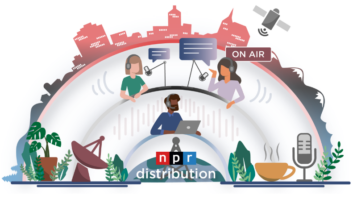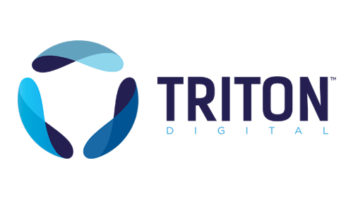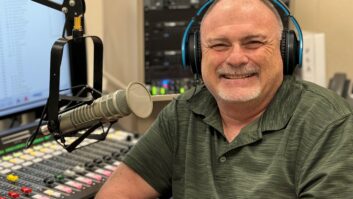
Gear being auctioned includes Pacific Recorders consoles and custom furniture, including that from Studio 3A, home of ‘Talk of the Nation.’Photo by Justin Foreman, NPR
Members of the technical staff at National Public Radio have been preparing to move for more than four years. As the staff transitions from one location in Washington to another, equipment at their current building is being liquidated.
The online auction, handled by Rasmus Auctioneers, is open to anyone, though NPR member stations get a leg up with special bidding credits.
NPR has called 635 Massachusetts Ave. NW its headquarters home since 1994. When “Morning Edition” signs off from that location at noon Eastern on April 19, NPR will have just a few days to finish removing everything of value from the old building before its lease runs out and the bulldozers move in.
Its new 440,000-square-foot home comes with nearly all-new digital equipment. Only the network’s signature Neumann U87 mics, some powered speakers and a handful of other gear will make the move east, to 1111 North Capitol Street.
That leaves three floors’ worth of studios and equipment that the network considered state-of-the-art in 1994. Now the contents of the plant are being sold off. The online auction began in March; by the time bidding closes, it promises to be one of the bigger studio auctions since last year’s liquidation of the old BBC World Service plant at London’s Bush House.
That auction, held in three installments, encompassed thousands of pieces of gear from dozens of studios, including huge quantities of tape decks, studio monitors and switching equipment.

‘This could be yours, if the price is right!’ NPR’s Mike Starling holds a CD player in the staging area for smaller items to be auctioned.Photo by Erich Shea, NPR
Mike Starling, NPR vice president and director of NPR’s Technology Research Center and NPR Labs, is leading a small team that took inventory of the network’s studios and storage rooms and prepared everything to be handed off to Rasmus.
Complete studios
Rasmus was approved for NPR’s auction after clearing out another large public broadcasting facility, PBS in northern Virginia. Rasmus “got high marks from PBS on how all that went,” Starling said.
NPR member stations get a 35 percent bidding credit for any items they want to buy, meaning a station that wins an item for a $100 bid would have to pay only $65 at the close of the auction. Why? “It was their membership dollars, without which we couldn’t have purchased this gear in the first place,” said Starling, who’d received inquiries from “a little over two dozen stations” as of early March.
As befits a facility that is described by Starling and other engineers as “the last of the great analog plants” when it opened almost two decades ago, the auction list includes a conservative estimate of 1,000 pieces of equipment, plus manuals and spare parts.
The contents of eight studios are being auctioned in eight blocks.
Starling said there are gems to be had, including the entire studios that have produced “All Things Considered,” “Morning Edition” and “Talk of the Nation” for two decades. Even the studio doors will be made available to winning bidders who are able to remove them.
Master Control is outfitted with what Starling calls an “enormous” 700-by-500 BTS switcher. The two largest studios, 4A and 4B, were built for the kind of live performance music programming NPR seldom produces, complete with massive Studer D950 consoles. Some studios include Pacific Recorders consoles and custom furniture, including Studio 3A, home of “Talk of the Nation,” and Studio 2A just below, where “All Things Considered” and “Morning Edition” originate.
For small items like rack-mounted audio processors and phone hybrids, NPR has been working with Rasmus to provide a packing and shipping service for winning bidders. For anything bigger, though, it will be up to winning bidders to fetch the gear themselves — and quickly. Starling and his staff took hundreds of smaller items out of service and staged them in two buildings next to NPR headquarters at times to be arranged for pickup after the online auction lots close. Rasmus planned to stage an on-site inspection of the items on April 12 from 10 a.m. to 4 p.m.
Starling acknowledges that the timing of the auction was less than ideal, given that it overlapped the NAB Show, which draws potential buyers to the other side of the country. But the scheduling of NPR’s move was set years ago, leaving little leeway for change, he said.
Online bidding

Studio 4B was built for music programming.Photo by Justin Foreman, NPR
Bids will close April 15 on a staggered schedule, five lots per minute, as Rasmus works through the catalog.
For the most part, Starling says, winning bidders get equipment that’s working well and has been professionally maintained.
“The notion is that if someone wants to build an entire studio at their station, they can come in here, we can give them access to that room and let them disassemble the furniture. We’ll get them elevator access and let them get everything onto their truck,” Starling said. Winning bidders will have to do their own disassembly and heavy lifting, with NPR staffers on-site only to ensure access to the studios, elevators and loading docks.
If that sort of buyer emerges, they’ll have to be ready to work quickly. The contents of the studios won’t be ready for disassembly until late in the process. That’s noon on Friday, April 19, for Studios 2A and 2B when the last NPR News staffers walk out the door and head north to their new homes. By the time the clocks on the wall (they’re for sale, too) strike midnight on the following Tuesday, April 23, NPR has to hand over the keys to landlord Boston Properties, which bought the property in 2008 and has been leasing it back.
Analog obstacle

A Pacific Recorder ABX-26 mixing console from NPR’s Studio 2D — a primary production studio for ‘Morning Edition.’Photo by Erich Shea, NPR
Will NPR find many takers? A quick check of several NPR affiliate station engineers in early March turned up little enthusiasm due to the equipment’s age and shipping concerns.
“We have no use for analog gear of any vintage — everything is digital here, and has been for years,” said Joe Puma, vice president of engineering and technology at Western New York Public Broadcasting Association FMs WNED/WBFO (FM), Buffalo, N.Y. “Plus, we don’t have the manpower to fix or maintain the old stuff.”
At a smaller pair of FMs, WIUM/WIUW, Macomb, Ill., TriStates Public Radio DOE Mark Garrett was interested in seeing what NPR would be selling, but expects the hassle of getting gear shipped from Washington would be a deal-breaker. “The costs associated with having a rep and shipping would probably negate any great deal we would receive.”
At Boston’s WBUR(FM), Chief Engineer Michael LeClair, who also is technical editor of Radio World Engineering Extra, said the most interesting auction items for him are patchbays.
“I am still a fan of jackfields and generally build studios with some jackfields to allow special ways to connect that routers aren’t necessarily able to do without some wiring drama. I think those jackfields would be something people want and would grab for short money.”
Starling said the auction is drawing considerable interest from stations closer to Washington that don’t have to worry about having gear shipped long distances. “We’ll see how many become serious bidders as the deadline approaches,” he said in mid-March. “It’s an absolute auction, so I expect some fairly incredible deals.”
The network has set no revenue goal; NPR just wants to make sure that whatever it leaves behind finds a good home. “As one of our senior vice presidents put it, it’s better to keep it out of the landfill,” Starling said, as well as “recycle equipment that still has a useful life; and if we can get a few dollars for it, so much the better.”
“There’s no time for us to do anything but get the right gear in the winning bidders’ hands.”
Anything that’s left unsold when the auction is over will probably be trashed or left behind for the demolition crew, an unfortunate consequence of the tight timing, according to Starling.
Hundreds of smaller items were taken out of service and staged in two buildings next to NPR, available for pickup after bids close.Photo by Erich Shea, NPRRadio Pot Luck

A mere sampling of the equipment being auctioned:
360 Systems ShortCuts
ADC patch panels
Ampex Tape Reels, new in box
Anvil cases
APC Smart-UPS 600 UPS
APT World Net Ohio codecs
Audio foam
Benchmark distribution amps
Blank CD-Rs
Blonder Tongue Labs AM Series agile modulator
Broadcast Tools SM111 silence monitors
CCS Musicam USA Roadrunner ISDN codecs
Conference room equipment
Custom wooden racks
dbx 160x compressor/limiters
Dell monitors
Denon DNM991R CD recorders
Digidesign MX001 Test Set
Dolby noise reduction gear
Eventide BD980 broadcast delay
Glensound GSGC4 data phones
Grass Valley system controllers
IBM Selectric II typewriters
JBL 4200 Series Studio Monitors
Leitch cdd-5400 clock distribution drivers
Lexicon 300 digital effects system
McIntosh MC2100E Power Amplifier
On-air lights
Orban 526A dynamic sibilance controllers
Otari MX5050BIII 2 reel machines
Panasonic WVCS304 camera
PR&E STX34 console
RAM PS1000 phasescopes
Ramsa WR-DA7A Audio Mixers
Scientific Atlanta AD6320 C-band downconverters
Sonic Solutions 702503 A/D converters
Sony DAT recorders
Sony MDS JE480 MiniDisc players
Sony PCM7010 DAT machines
Sony, HHB, Technics and Harman Kardon CD players
Sony, Pioneer and other DVD players
Soundcraft LM1 mixers
Studer A827 24 Multi-Channel Tape Recorder
Studer A810 open-reel decks
Studer D9505 console
Switches
Symetrix 528E processors
Tascam 122MKIII cassette decks
Technics SL 1500 turntables
Telos 9202 Zephyr w/TA
UREI 565T filter sets






